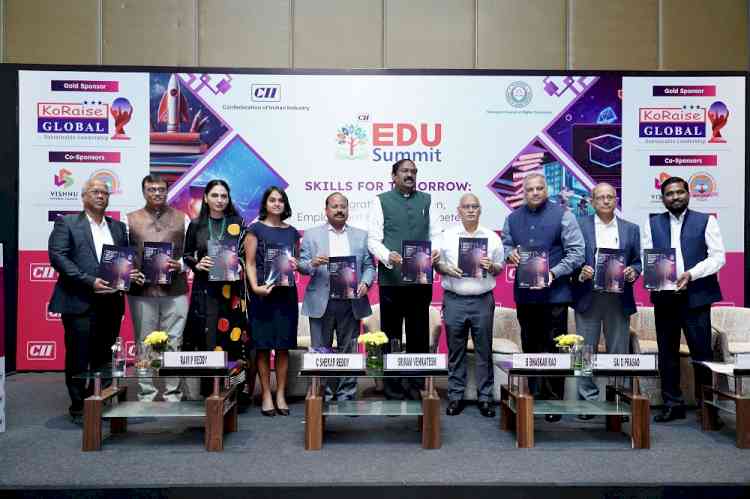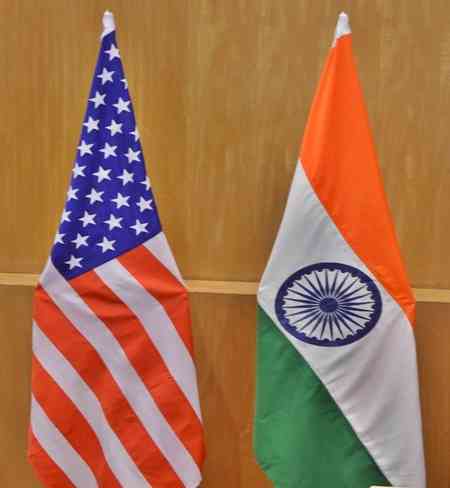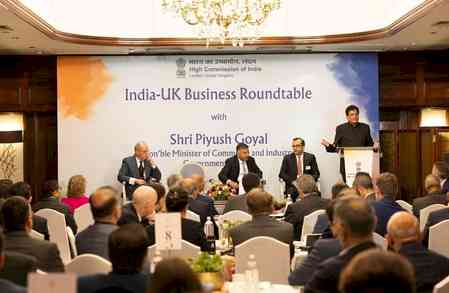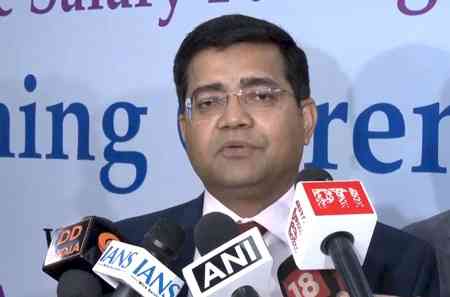Education and skills need to be taught together and the role of the teacher is to help students to discover themselves
CII Telangana organised its annual flagship event 5th Edition of CII Telangana EDU Summit with the theme ‘Skills for Tomorrow: Integrating Education, Employment & Global Competence’ on Friday in Hyderabad.

Hyderbad, November 29, 2024: CII Telangana organised its annual flagship event 5th Edition of CII Telangana EDU Summit with the theme ‘Skills for Tomorrow: Integrating Education, Employment & Global Competence’ on Friday in Hyderabad.
On this occasion, a CII -EY Parthenon’s Report on Bridging the Gap: Bridging the gap: Integrating skilling into Telangana’s education system was released during the inaugural session of EDU Summit 2024.
While addressing the conference, Sri Devasena, IAS, Commissioner, Department of Technical & Collegiate Education, Government of Telangana said that Children of Government Schools are very innovative and very courageous. She also mentioned about Centre for Creative Learning at IIT Gandhi Nagar how their learning models could be replicated in the schools and colleges in Telangana. Teachers should teach as per the requirements of the Children and inculcate joy of learning among the students. Teachers need to create an environment that is both engaging and meaningful. BFSI Consortium may become a path breaking intervention in the long run in the Skill Development area.
VLVSS Subba Rao, Vice Chancellor, Telangana Young India Skills University, said that In today's rapidly changing world, it is no longer enough to simply impart academic knowledge; students must also acquire practical skills that enable them to apply their learning in real-world contexts. Combining education with skills development is essential for preparing students for the challenges and opportunities of the future. the concept of "future-proofing" education or personal development is indeed a self-driven intervention, meaning it requires proactive, continuous, and intentional efforts by individuals to adapt to evolving challenges and opportunities.
Prof. Sri Ram Venkatesh, Secretary, Telangana State Council of Higher Education said that good teaching begins in the classroom, but it's equally important that curriculum development is regularly revised and updated to meet the evolving needs of students, the workforce, and society at large. A dynamic and responsive curriculum is essential to ensure that education remains relevant, effective, and aligned with the latest pedagogical practices and societal demands. Faculty should visit industry on regular basis.
Dr. Avantika Tomar, Partner, EY-Parthenon in her address mentioned that "Integrating skill education and vocational training into traditional education models is essential for enhancing the growth and global competitiveness of India. Telangana’s impressive achievement of the highest growth in real GSDP among all states in FY24, surpassing national GDP growth, reflects its commitment to progress. The state has also made significant strides in expanding educational access beyond the national average, thanks to a series of impactful initiatives and reforms. However, as highlighted in the Bridging the Gap: Integrating Skilling into Telangana’s Education System report, prepared by EY-Parthenon in collaboration with CII, there are still critical opportunity areas. These include aligning academic curricula with industry skill requirements, strengthening industry-academic partnerships for internships, increasing the focus on soft skills, and developing more structured vocational programs to meet market demands. By addressing these gaps, Telangana can ensure its youth are well-prepared for the high-growth sectors that will drive its economic future."
Sai Prasad, Chairman, CII Telangana, emphasized, "CII has consistently advocated for strategic policy recommendations aimed at positioning Telangana as a $1 trillion economy. We believe that fostering an ecosystem conducive to sustainable growth requires a multi-faceted approach, including enhanced industry-academia collaboration. In this context, one of the key areas we are focusing on is the integration of industry internships, not just for students, but also for faculty members. By making internships mandatory for faculty, we can ensure that educators are more closely aligned with industry trends, thereby enhancing their teaching methods and better preparing students for the workforce. This will bridge the gap between academia and industry, driving innovation and increasing employability in the long run."He also said that Heritage and culture play a crucial role in education by shaping the identity of individuals, fostering a sense of belonging, and enhancing learning experiences. Incorporating heritage and culture into educational practices offers numerous benefits for both students and society.
Dr B Bhaskar Rao, CMD, KIMS Hospitals said that teachers should challenge students, and it's equally important to instill values like the dignity of labor and encourage critical thinking. These elements are essential for the holistic development of students, preparing them not only for academic success but also for active, responsible participation in society.
The summit was addressed by many eminent speakers from both Industry and academia.


 City Air News
City Air News 










